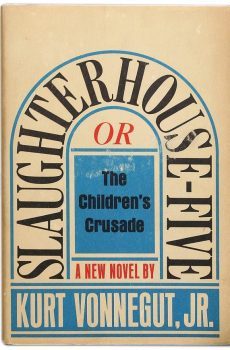Kevin Powers in The New York Times:
 There is an eminently useful thought experiment with which I suspect you are familiar. It goes something like, “What would an alien think of ____?” The blank is typically filled in with something like sex, or our destructive relationship to the natural world, or money. War is sometimes used to fill that blank, too. The point of the thought experiment is to invent a kind of critical distance between a particular aspect of human behavior and ourselves, the ones behaving un-self-consciously like humans. This thought experiment is useful precisely because it forces a perspective so separate, or alien, that with a little luck we gain some insight into why we are the way we are or why we do the things we do, like procreate, or poison our habitat, or hoard digital proxies for paper proxies for bits of rare but not all that rare metals, or watch old people get machine-gunned to death, or firebomb medium-size German cities. I’ve often thought that “Slaughterhouse-Five” is a variation on this kind of thought experiment; it has few if any equals in creating the kind of distance that can offer insight into the mass insanity of modern warfare.
There is an eminently useful thought experiment with which I suspect you are familiar. It goes something like, “What would an alien think of ____?” The blank is typically filled in with something like sex, or our destructive relationship to the natural world, or money. War is sometimes used to fill that blank, too. The point of the thought experiment is to invent a kind of critical distance between a particular aspect of human behavior and ourselves, the ones behaving un-self-consciously like humans. This thought experiment is useful precisely because it forces a perspective so separate, or alien, that with a little luck we gain some insight into why we are the way we are or why we do the things we do, like procreate, or poison our habitat, or hoard digital proxies for paper proxies for bits of rare but not all that rare metals, or watch old people get machine-gunned to death, or firebomb medium-size German cities. I’ve often thought that “Slaughterhouse-Five” is a variation on this kind of thought experiment; it has few if any equals in creating the kind of distance that can offer insight into the mass insanity of modern warfare.
But it is so much more than a uniquely useful thought experiment on war. It is equally remarkable in the innovative way its structure is married to, and made necessary by, the story itself. Just before his capture by the Germans during the war, our hero, Billy Pilgrim, becomes “unstuck in time.” Later in the narrative we learn that this is a consequence of Billy’s subsequent abduction by Tralfamadorians, aliens who happen to be unbound by the normal limitations of time and space. Through this ingenuous device Kurt Vonnegut shows the past as an irresistible force, particularly in the case of those who have trauma at the center of their experience. The war intrudes on Billy’s later life in a way that will be immediately familiar to those who have fought in one. His past arrives without invitation, bouncing between the war, his childhood and his unremarkable later life as an optometrist, which is itself punctuated by visits to mental and veterans hospitals. As the narrative progresses we begin to understand that for a man who has witnessed the horrors that Billy has, the Tralfamadorians’ belief that the past, present and future are merely the primitive notions of Earthlings starts to sound like a comforting explanation for the intrusive nature of traumatic experience.
More here.
